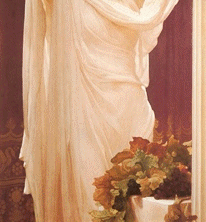
Rabindranath Tagore (1861-1941) was a Bengali poet, philosopher, artist, playwright, composer and novelist. India's first Nobel laureate, Tagore won the 1913 Nobel Prize for Literature. He composed the text of both India's and Bangladesh's respective national anthems. Tagore travelled widely and was friends with many notable 20th century figures such as William Butler Yeats, H.G. Wells, Ezra Pound, and Albert Einstein. While he supported Indian Independence, he often had tactical disagreements with Gandhi (at one point talking him out of a fast to the death). His body of literature is deeply sympathetic for the poor and upholds universal humanistic values. His poetry drew from traditional Vaisnava folk lyrics and was often deeply mystical. Translated by Rabindranath Tagore |
Hold the world's wisdom in the palm of your hand. Over 1700 books. |
| On Twitter, follow 'sacredtexts.' |
| Sacred-texts on Facebook |
|
|
 Buy a DVD or USB 1700+ books. Support this site. |





